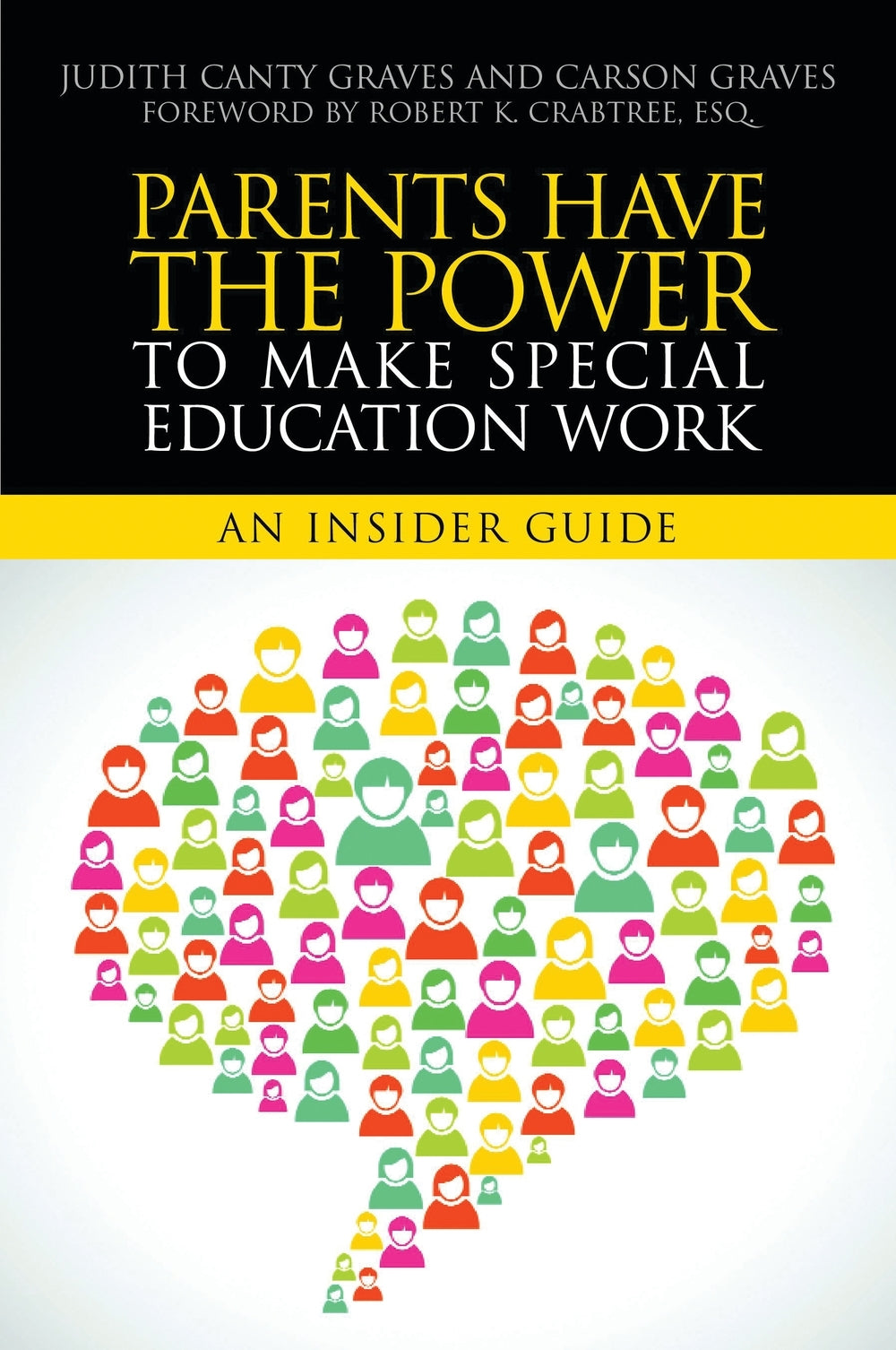
Press Reviews
from the foreword by Robert K. Crabtree, Esq., Kotin, Crabtree & Strong, LLP, Boston
The book you hold in your hand offers a lucid and pragmatic guide...through the maze of public and private procedures that parents must navigate to secure the services that their children with disabilities need...Read this book and keep it handy for frequent reference! And may you, with its help, fight your way to a fantastic program for your child!
Pam Wright and Pete Wright, nationally recognized experts in the fields of special education law and advocacy
Parents Have the Power to Make Special Education Work is like having a trusted, knowledgeable friend to guide you along each step of your journey through special education. It will help you understand the laws and resolve the hidden issues that are unique to special education and school culture. Kudos to Judith and Carson Graves for writing this superb book!
Richard J. Robison, Executive Director, Federation for Children with Special Needs, Boston, MA
Parents Have the Power to Make Special Education Work is a must read for families of children who receive special education services. The authors have carefully woven their personal experiences with a precise understanding of the law. They provide insight and helpful tips about how the process plays out in a school environment. Parents and professionals can learn from their successes and the pitfalls that may occur. I heartily recommend this volume - sooner rather than later!
Nan Aron, Founder and President of Alliance for Justice
Based on their own experiences, Judith Canty Graves and Carson Graves demonstrate that parents have the power to ensure that their children with special needs get the quality education they need, and by right, must receive. With clear tips and action steps, this hopeful and inspiring book is a must-read for any parent navigating the special education maze.
Eileen M. Costello, MD, Pediatrician, Southern Jamaica Plain Health Center of Brigham and Women's Hospital and co-author of Quirky Kids: Understanding and Helping Your Child Who Doesn't Fit In - When to Worry and When Not to Worry
At last, a clear, concise, and no-nonsense guide for parents navigating the special education system on behalf of their child with a disability of any kind. This book will be referred to time and again by parents seeking a partnership with educators to foster the best possible outcome for their child. Bravo!
Edward Hallowell, MD, writer and founder of The Hallowell Center
This book is a "must own" for any parent of a child in need of special education services. With concise descriptions of special education laws and the services that public schools are mandated to provide to students who learn differently, parents can feel armed with the information they need to get the services their child needs. Picking up this book should be the first step for any parent who is either beginning, or is already struggling with, the special education process.
Kirkus Reviews
A husband and wife team up to present a cleareyed, informative guide for parents of children in special education. The Graves' how-to debut includes practical recommendations for other mothers and fathers traversing the sometimes-bureaucratic maze of special ed. In the early 1990s, the authors discovered that their 3-year-old son needed help, and this text includes many examples from their 15 years of experience. This easy-to-understand resource covers many facets, from requesting eligibility testing to transitioning a child into adult life after high school graduation. It includes a summarized history of special education, but it mainly offers hands-on advice, such as how to understand school evaluations and participate in productive team meetings. Instead of overwhelming readers with jargon, the authors introduce only a few important acronyms, such as the IEP, or Individualized Education Program (or Plan). The IEP is an important legal document, updated each year to identify a child's abilities and needs, which determines the special education services he or she will receive; the Graves explain how to develop an effective IEP with specific, measurable goals. The well-referenced text also contains simple but useful action steps ("What Parents Can Do") at the end of each chapter. For example, one suggests ways to be prepared for meetings: "Talk through your issues for the meeting with your spouse, partner, advocate, or trusted friend. Write down your concerns, then create a proposed agenda and share it with your special education liaison." The book also looks at when to bring in professionals, such as advocates, from "outside" the system. Teachers and administrators may bristle a bit at some topics, such as when to hire a lawyer, but the tone is mostly evenhanded; for example, the Graves repeatedly suggest that parents remain cordial to educators, even during disagreements. A viable resource for helping children obtain the best special education possible.
